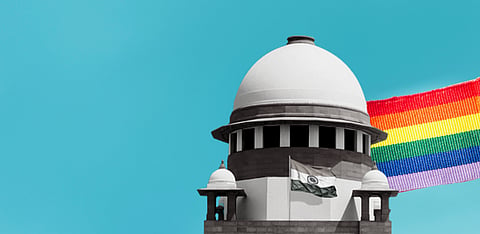

A two-judge Bench comprising Justices B.V. Nagarathna and Ujjal Bhuyan observed that it could not issue a writ of mandamus to the rule-making body to enact a law on a particular subject and in a particular manner.
—
ON Tuesday, the Supreme Court turned down an application seeking to amend the Gender Sensitisation and Sexual Harassment of Women at the Supreme Court of India (Prevention, Prohibition and Redressal) Regulations, 2013 to the effect that an 'aggrieved women' in those regulations should be made gender-neutral so as to include LGBTQIA+ persons as aggrieved within the regulations.
A two-judge Bench comprising Justices B.V. Nagarathna and Ujjal Bhuyan observed that it could not issue a writ of mandamus to the rule-making body to enact a law on a particular subject and in a particular manner.
The Bench also observed that the directions sought from it would dilute the whole purpose of the 2013 regulations because these regulations were framed with regard to Article 15(3) of the Constitution of India and in order to extend the constitutional right of equality and equal protection of the laws to women.
Sensing the mood of the Bench, senior advocate Vibha Datta Makhija, who herself was an applicant, chose to withdraw her application with the liberty to make a representation to the gender sensitisation committee of the Supreme Court for the formulation of another body of regulations to cover persons belonging to the LGBTQIA+ community for their protection from sexual harassment at the Supreme Court of India.
In 2013, a writ petition was filed by two advocates namely Binu Tamta and Makhija, for certain reliefs on the basis of a newspaper report, which had reported about an incident that had occurred at the Delhi High Court, alleging that an employee of the high court had been filming lady advocates in the chamber toilet.
The court had then directed the administration of the Supreme Court to adopt the guidelines laid down by it in Vishaka and Others versus State of Rajasthan and Others.
Accordingly, in 2013, the Supreme Court, on the administrative side, notified the 2013 regulations.
As per Rule 2(a), 'aggrieved woman' means, "in relation to the Supreme Court, any female, of any age, whether employed or not, who claims to have been subjected to any act of sexual harassment by any person in the Supreme Court of India precincts but does not include any female who is already governed by the Supreme court service regulations.
These regulations were framed under the Sexual Harassment of Women at Workplace (Prevention, Prohibition and Redressal) Act, 2013. It is an Act to provide protection against sexual harassment of women at workplace and for the prevention and redressal of complaints of sexual harassment and for matters connected therewith or incidental thereto.
Even though the court has declined to amend the regulations, earlier this year, the Chief Justice of India Dr D.Y. Chandrachud nominated senior advocate Menaka Guruswamy, who identified herself as queer, to the Supreme Court gender sensitisation and internal complaints committee.
Click here to read the Order.